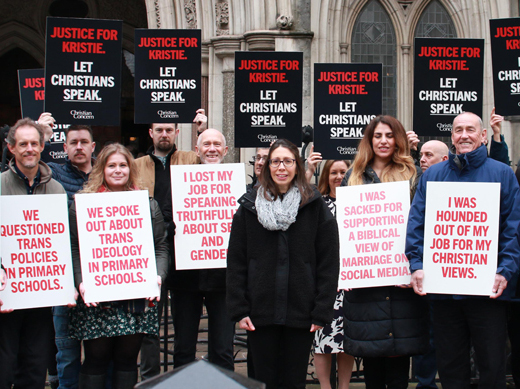Kristie Higgs, who lost her job as a pastoral assistant at a UK school for sharing her views in Facebook posts about a course of “Relationship Sexuality Education being taught in schools, has won her six-year legal battle. The Court of Appeal has found that her dismissal was unlawful discrimination on the ground of religion or belief.
After an anonymous person saw two of Higgs’s personal Facebook posts sharing her concerns about sex education lessons at her child’s primary school, she was reported to her headteacher. Kristie was told that her private posts could bring “the school into disrepute” and was subsequently sacked from her position.
“Expressing biblical Christian teaching on gender and sexuality may appear to be offensive to those who hold the opposite views, but as today’s judgment signals, Christians have a right to express their beliefs publicly,” Kristie Higgs said
“This is not just about me. Too many Christians have suffered discipline or marginalisation at their work because of their Christian faith.
“I’m thankful to Andrea Williams, Christian Concern and the Christian Legal Centre.”
The question of the language used in Higg’s posts, rather than her Christian beliefs was cited as the reason for her dismissal.
A Higgs post example sited in the judgement included “On November 7th the Government Consultation into making Relationships Education mandatory in primary schools, and Relationships and Sex Education mandatory in secondary schools closes. Which means, for example, that children will be taught that all relationships are equally valid and ‘normal’, so that same sex marriage
is exactly the same as traditional marriage, and that gender is a matter of choice, not biology, so that it’s up to them what sex they are.
“At the same time it means that expressing and teaching fundamental Christian beliefs, relating to the creation of men and women and marriage will in practice become forbidden – because they conflict with the new morality and are seen as indoctrination into unacceptable religious bigotry.”
An example of something reposted by Higgs inclded “The far-left zealots have hijacked the learning environment, and they insist on cramming their perverted vision of gender fluidity down the throats of unsuspecting school children who are a government mandated captive audience.”
“Lying to children and convincing them that they can be anything they want to be when in reality they can’t is a form of child abuse, especially when it entails the changing of one’s genitalia or ingesting hormones.”
A school disciplinary panel found Higg’s posts ammountyed to “gross misconduct” and the school sacked her. Higgs appeals to Employment tribunals and then the courts took six years.
The Court of Appeal judgment deals with Higgs’ free speech rights under article 9 of the European Convention on Human Rights titled “Freedom of thought, conscience and religion”. which deals wiith the right to hold and manifest belief.
Lord Justice Underhill the author of the Court of Appeal judgment quotes the Ngole case in which a University ban on a Christian social work student based on his social media posts was overturned.
“The mere expression of views on theological grounds (e.g. that ‘homosexuality is a sin’) does not necessarily connote that the person expressing such views will discriminate on such grounds. In the present case, there was positive evidence to suggest that the Appellant had never discriminated on such grounds in the past and was not likely to do so in the future (because, as he explained, the Bible prohibited him from discriminating against anybody).”
Underhill writes “Even if readers of the posts might fear that the Claimant would let her views
influence her work, neither the panel nor the ET [employmnet tribunal] believed that she would do so. There was no reason to doubt her assertion that her concern was specifically about the content
of sex education in primary schools; that she “wouldn’t bring this into school”; and that
she would never treat gay or trans pupils differently (see para. 16 above). There had
indeed been no complaints about any aspect of her work for over six years.”
“I do not believe that dismissal was even arguably a proportionate sanction for the Claimant’s conduct. It was no doubt unwise of her to re-post material expressed in (to use the ET’s words) florid and provocative language with which she did not agree, and in circumstances where people were liable to realise her connection with the School. But I cannot accept that that can justify her dismissal, and
still less so where she was a long-serving employee against whose actual work there
was no complaint of any kind.”
Underhill addresses the question of discrimination against christians for expressing their beliefs, proportionality and offensive language.
“The dismissal of an employee merely because they have expressed a religious or
other protected belief to which the employer, or a third party with whom it wishes
to protect its reputation, objects will constitute unlawful direct discrimination
within the meaning of the Equality Act.
“However, if the dismissal is motivated not simply by the expression of the belief
itself (or third parties’ reaction to it) but by something objectionable in the way in which it was expressed, determined objectively, then the effect of the decisionin [a cited case] Page v NHS Trust Development Authority is that the dismissal will be lawful if, but only if, the employer shows that it was a proportionate response to the objectionable feature – in short, that it was objectively justified.”
The other two judges hearing the case agreed with Underhill.
In the Guardian’s report of the judgment, a spokesperson of the LGBTQIA group Stonewall takes up the proportionality argument: “Today’s court of appeal ruling is a judgment on the proportionality of her dismissal, not an endorsement of the beliefs she expressed. This judgment does not weaken the responsibility of schools and institutions to uphold inclusive policies, or to tackle discriminatory environments for both students and staff.”

